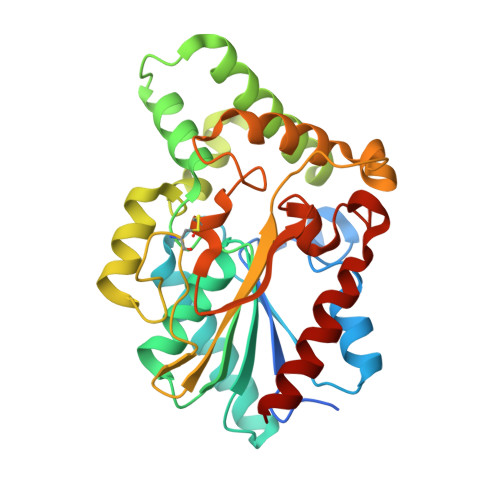Dieselzymes: development of a stable and methanol tolerant lipase for biodiesel production by directed evolution.
Korman, T.P., Sahachartsiri, B., Charbonneau, D.M., Huang, G.L., Beauregard, M., Bowie, J.U.(2013) Biotechnol Biofuels 6: 70-70
- PubMed: 23648063
- DOI: https://doi.org/10.1186/1754-6834-6-70
- Primary Citation of Related Structures:
4HS9 - PubMed Abstract:
Biodiesels are methyl esters of fatty acids that are usually produced by base catalyzed transesterification of triacylglyerol with methanol. Some lipase enzymes are effective catalysts for biodiesel synthesis and have many potential advantages over traditional base or acid catalyzed transesterification. Natural lipases are often rapidly inactivated by the high methanol concentrations used for biodiesel synthesis, however, limiting their practical use. The lipase from Proteus mirabilis is a particularly promising catalyst for biodiesel synthesis as it produces high yields of methyl esters even in the presence of large amounts of water and expresses very well in Escherichia coli. However, since the Proteus mirabilis lipase is only moderately stable and methanol tolerant, these properties need to be improved before the enzyme can be used industrially. We employed directed evolution, resulting in a Proteus mirabilis lipase variant with 13 mutations, which we call Dieselzyme 4. Dieselzyme 4 has greatly improved thermal stability, with a 30-fold increase in the half-inactivation time at 50°C relative to the wild-type enzyme. The evolved enzyme also has dramatically increased methanol tolerance, showing a 50-fold longer half-inactivation time in 50% aqueous methanol. The immobilized Dieselzyme 4 enzyme retains the ability to synthesize biodiesel and has improved longevity over wild-type or the industrially used Brukholderia cepacia lipase during many cycles of biodiesel synthesis. A crystal structure of Dieselzyme 4 reveals additional hydrogen bonds and salt bridges in Dieselzyme 4 compared to the wild-type enzyme, suggesting that polar interactions may become particularly stabilizing in the reduced dielectric environment of the oil and methanol mixture used for biodiesel synthesis. Directed evolution was used to produce a stable lipase, Dieselzyme 4, which could be immobilized and re-used for biodiesel synthesis. Dieselzyme 4 outperforms the industrially used lipase from Burkholderia cepacia and provides a platform for still further evolution of desirable biodiesel production properties.
- Department of Chemistry and Biochemisty, UCLA-DOE Institute of Genomics and Proteomics, Molecular Biology Institute, University of California, Los Angeles, USA. bowie@mbi.ucla.edu.
Organizational Affiliation:





















